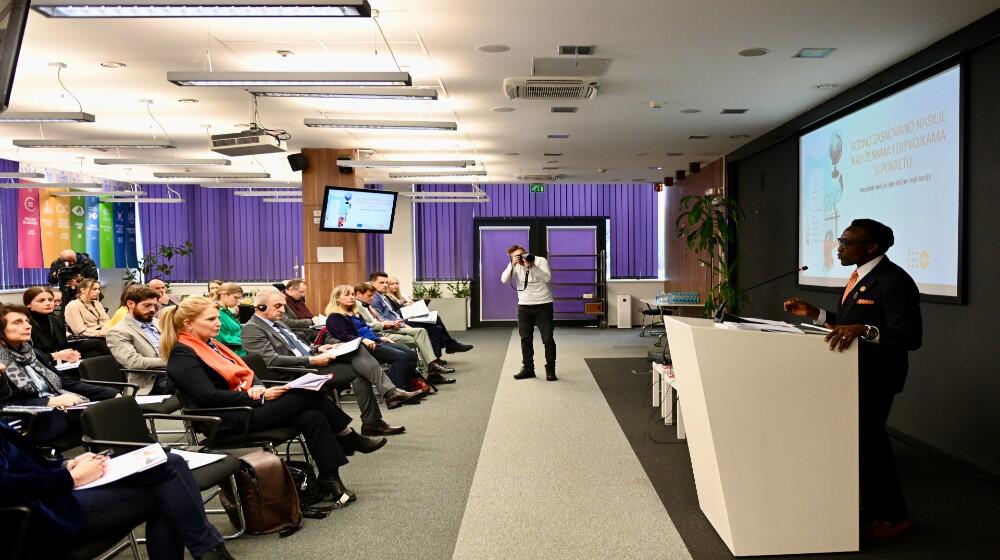Presentation of the study on gender-based violence against women and girls on the move
Sarajevo, 30 November 2023 - A conference: “Presentation of the study gender-based violence against women and girls on the move” was organized today in Sarajevo by the UNFPA, the United Nations Population Fund in cooperation with the Office of the European Union in Bosnia and Herzegovina within the annual ‘16 days of Activism Against Gender Based Violence’ campaign.
During emergency situations, migrations, risks of sexual and physical violence, forced and/or coerced prostitution, and trafficking for sexual exploitation and/or any type of GBV are escalated.
The main goal of the study was to maximize the use of data collected on the experiences of women and girls throughout their migration journey. The information involved a mixed research approach, assessing the impact of the migration journey, the occurrence of GBV, and matters pertaining to sexual and reproductive health. With this, UNFPA seeks to improve understanding of these phenomena and establish a basis for developing future protection programmes for women and girls on the move. UNFPA’s secondary aim is to enable Bosnian and Herzegovinian institutions to assume complete management and coordination of responses to gender-based violence in all emergency situations, stressed John Kennedy Mosoti, UNFPA Representative in BiH in his opening remarks.
The study's significance is evident in its ability to uncover essential information regarding the traits of survivors and their migration experiences, facilitating a targeted response to gender-based violence. Key factors include age, educational attainment, marital status, and the cultural context of origin for women and girls. Additionally, the duration of the migration journey, the frequency of irregularly crossing state borders, and the financial resources available for the trip are emphasized, said author of the study Srđan Vujović.
Elisabet Tomasinec, Head of the Political Section at the EU Office in BiH stressed that both migration and gender equality are key priorities that the EU has put in front of BiH as important segments to improve on its path towards the EU. She concluded that these topics inevitably intertwine, and are both of major concern as they tackle core EU values. Over the years, the EU has provided substantial assistance to BiH in both these fields and will continue to do so in a spirit of the EU-BiH cooperation, to support BiH institutions in improving migration management, gender equality and bring BiH closer to its EU family.
The conference brought together some 40 representatives from government bodies, humanitarian organizations, civil society, academia, and media.
The Service for Foreigners' Affairs successfully cooperates with the UNFPA in ensuring an effective response to gender-based violence, while relying on clearly defined referral mechanisms and procedures in temporary reception centres. We welcome the fact that the study recommendations will help us boost our response to gender-based violence in the process of further transition of the service to the relevant institutions in BiH, said Žarko Laketa, Director of the Service for Foreigners' Affairs.
UNFPA BiH has made a significant contribution to the humanitarian response to the migrant and refugee population since 2018, with the support of European Union since 2018. The work and achievements of this organisation relate primarily to the coordination and prevention of and response to GBV and sexual and reproductive health issues.
Note to the editors:
The project “Individual measure to strengthen the response capacity to manage migration flows in Bosnia and Herzegovina” is funded by the European Union through an Instrument for Pre-Accession Assistance (IPA) and implemented by the International Organization for Migration (IOM) in partnership with United Nations High Commissioner for Refugees (UNHCR), United Nations Children's Fund (UNICEF), United Nations Population Fund (UNFPA) and Danish Refugee Council (DRC).
###
For more information please contact: Majda Prljača, UNFPA, prljaca@unfpa.org or +38761171673



